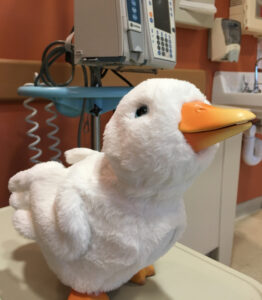- South Texas Students Meet Accordion Music Icons Los Tigres Del Norte In Edinburg Thanks To Khs America/Hohner Alianza Académica Initiative
- Fragile Planet Offers a Nighttime Wildlife Experience
- Falcons Soccer Off & Running
- Cameron County Receives Funds to Improve Two Parks
- Falcons Complete First Half of 32-6A
- School District to Help out Victims of California Wildfires
- Sand Castle Days Continued Despite Unexpected Weather
- Ready for District
- Discussion of Garbage Dumpster Rates, Agreements Between State & City on Highway Regulations, and More
- 31st Annual Shrimp Cook-Off is Right Around the Corner
How New Technology is Helping Children Cope with Cancer
- Updated: April 20, 2018

New comforting technology can help young cancer patients communicate their feelings to parents and doctors.
(StatePoint) One of the toughest aspects of managing cancer in children is communicating with young patients, say parents and healthcare experts.
“There were many times when my daughter did not want to talk or communicate her feelings,” says Joycelynn Sanchez of now 6-year-old Jiani, who at age 3, was diagnosed with acute lymphoblastic leukemia. “She grew tired of the pokes and the questions and would become withdrawn.”
Fortunately, many parents and doctors are finding that new technology can help young patients like Jiani better communicate their feelings and manage their condition. For example, My Special Aflac Duck, a creation of Aflac, an insurance industry leader, and Sproutel, a research and development workshop, is an award-winning smart companion that nuzzles, quacks and dances with the lifelike movement of a real duckling. While entertaining, it’s not a toy. It’s specifically designed to help comfort, teach and empower young patients as they go through their journey with cancer, reflecting the belief that children need more than medicine to cope with the stress and loneliness that often come with their disease.
“On average, childhood cancer treatment lasts more than 1,000 days,” says Aaron Horowitz, CEO and co-founder of Sproutel. “We thought there must be a way to help alleviate some of the burden.”
Using the new companion technology, children can communicate their emotions by tapping colorful emoji cards to a sensor on the duck’s chest. Tap an emoji with a happy expression and it responds with delighted quacking. Choose the sad face and it lowers its head and sighs. Children can mirror their care routines through a compatible web-based app, including medical play and feeding and bathing their duck via augmented reality. It also dances, quacks, and nuzzles to help distract and calm them. Its exterior can even be removed, washed and sanitized.
Creation of the comforting companion is an extension of Aflac’s 22-year, $122 million commitment to childhood cancer causes. Their goal is to provide this feathered friend free of charge to all newly diagnosed children, nearly 16,000 each year according to the National Cancer Institute. Distribution, targeted to begin this coming winter, will be through hospitals, and the robotic duck will not be for general consumer sale.
Jiani’s treatment, which lasted three years and included various chemotherapies, as well as countless spinal taps and antibiotics, was completed in December 2017. “There were some tough times, but through it all, she was a champion,” says Sanchez. “Knowing tough times for other children with cancer may be made a little easier with the help of technology makes me very happy.”
